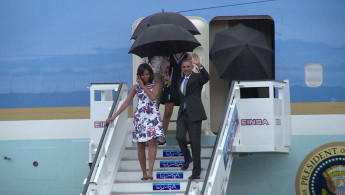Obama scores foreign policy victory with historic Cuba visit
President Barack Obama is making an historic state visit to Cold War-era foe Cuba, a first for a sitting US president in 88 years, scoring a rousing foreign policy victory after the detente with Iran to solidify his legacy in the last year of his White House tenure.
Obama's Air Force One touched down on Sunday in Havana, where the US president will hold talks with Cuban President Raul Castro, tour the newly reopened US embassy and attend a baseball game.
He also plans to visit a state-owned micro-brewery and attend a state dinner on Monday, before delivering a speech live on Cuban television before leaving on Tuesday.
Obama is not only the first sitting US president to visit since Fidel Castro's guerrillas overthrew the US-backed government of Fulgencio Batista in 1959, but the first since President Calvin Coolidge in 1928.
Despite heavy opposition from the Republicans, the Democrat president has been emboldened by the fact that he faces no re-election battle, to push ahead with ending decades of Cold War animosity with the Communist regime in Havana.
 |
Never in my dreams or nightmares could we have imagined that we’d see such a thing. --Leonardo Padura |
 |
Ladies in White
For Cubans dreaming of escaping isolation and reinvigorating their threadbare economy, the visit has created huge excitement.
"A president of the United States in Cuba, arriving in Havana on his Air Force One," popular Cuban writer Leonardo Padura wrote on the Cafefuerte blog.
"Never in my dreams or nightmares could we have imagined that we'd see such a thing."
But minutes before Obama took off for Cuba, police in Havana arrested dozens of people from a banned group demanding greater human rights, AFP reporters said.
The protesters were from Ladies in White, a group formed by wives of former political prisoners.
Republicans and some human rights activists have criticised Obama for dealing with Castro, given the lack of political, media and economic freedom in a country where the Communist Party retains tight control.
Dissidents called for "radical change" on the eve of the visit, but the Castro government warned that lectures on democracy would be "absolutely off the table".
White House deputy national security adviser Ben Rhodes insisted, however, that the subject would be brought up. Obama will meet members of Cuba's beleaguered opposition and will give a speech on Tuesday at the National Theatre, carried live on Cuban television.
 |
Although a decades-long US economic embargo remains in place large cracks in the sanctions regime are appearing. |  |
'Incremental detente'
The United States spent decades trying to topple Cuba's communist government. Washington attempted economic strangulation, the failed 1961 Bay of Pigs invasion and CIA assassination plots against Fidel Castro - including the legendary, but unproven, story of sending him an exploding cigar.
Now, after so many failures, Obama has bet that soft power will achieve what muscle could not. The aim, Rhodes said, is to make "the process of normalisation irreversible".
Although a decades-long US economic embargo remains in place - and can only be removed by the Republican-controlled Congress - large cracks in the sanctions regime are appearing.
Obama hopes that a host of incremental and seemingly technical steps will open Cuba's economy, transforming the island economically and politically, backers of the policy say.
Cuba's regime, which for decades defined itself as the people's bulwark against the Yankee enemy, has bowed to the fact that Cubans would rather do business than make war.
And as if Obama's arrival were not enough to illustrate the sea change in Cuba, the Rolling Stones - a symbol of the cultural imperialism that communist leaders once raged against - are playing a free concert in Havana on Friday.





 Follow the Middle East's top stories in English at The New Arab on Google News
Follow the Middle East's top stories in English at The New Arab on Google News

![Israeli forces ordered bombed Gaza's Jabalia, ordering residents to leave [Getty]](/sites/default/files/styles/image_330x185/public/2176418030.jpeg?h=a5f2f23a&itok=_YGZaP1z)
